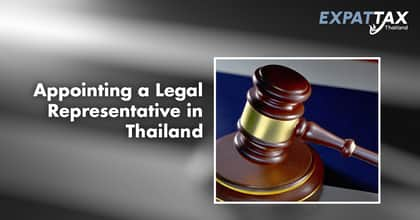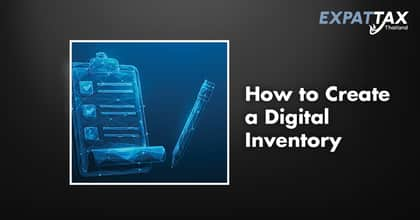Thailand has confirmed the widely expected five-year personal income tax break on crypto gains under certain conditions. Under Ministerial Regulation No. 399, published in the Royal Gazette on 5 September 2025, profits from selling cryptocurrencies and digital tokens are tax-free when traded through a Thai-authorised exchange, broker or dealer. The exemption applies to income received from 1 January 2025 to 31 December 2029 and only to the gain above your original cost.
More detailed explanations will come from Expat Tax Thailand over the coming months, once the Revenue Department holds training sessions on how this will work in practice. Until then, here is what we know.
Key Facts: Thailand Crypto Tax Exemption at a Glance
- What changed: Crypto and digital-token gains are exempt from Thai personal income tax when sold through a Thai-authorised exchange, broker or dealer
- When: Applies to income received from 1 January 2025 to 31 December 2029
- What is exempt: Profit from qualifying sales (sale proceeds minus purchase cost and direct trading fees)
- Who it helps: Individuals only — ideal for expats trading on Thai-licensed platforms
Who Qualifies for the Thailand Crypto Tax Exemption
You qualify if you are an individual who sells crypto or digital tokens and makes a profit through a Thai-authorised exchange, via a Thai-authorised broker, or to a Thai-authorised dealer.
If you are a Thai tax resident, the exemption can remove Thai personal income tax on qualifying gains. If you are not a resident, Thai tax usually applies only to Thai-sourced income. If in doubt, ask us
Authorised Crypto Platforms: Check on SEC Thailand
‘Authorised’ means licensed in Thailand under the Digital Asset Business law. The Minister of Finance grants licences on the SEC’s recommendation.
You can check whether a platform is authorised using the SEC Thailand’s official list of licensed digital-asset operators (exchanges, brokers and dealers).
These include exchanges like Orbixtrade, Bitkub, kucoin, waanx, binance and coins.co.th
Cryptocurrency Exemptions from Personal Income Tax
- Profit from selling crypto or digital tokens through a Thai-authorised exchange, broker or dealer
- Only the profit (sale price minus what you paid and any direct trading fees)
- Income received between 1 January 2025 and 31 December 2029
Examples: Tax-Free Crypto Gains on Thai-Licensed Platforms
You buy 1 BTC today for THB 3.5 million
- In October 2026, you sell 0.5 BTC for THB 2.1 million
- Your cost for 0.5 BTC was THB 1.75 million
- Profit = THB 350,000 is tax exempt
- In October 2029, you sell the remaining 0.5 BTC for THB 5 million
- Your remaining cost was THB 1.75 million
- Profit = THB 3.25 million is tax exempt
Total: You invested THB 3.5 million for a tax-free gain of THB 3.6 million, assuming both sales are through Thai-authorised platforms and within 2025–2029. If you pay trading fees, add them to the cost or deduct them from the proceeds to work out the actual profit.
What Is Not Covered by the Exemption
The exemption does not apply to:
- Trades on apps without a Thai licence
- DeFi swaps and DEX trades
- Derivatives, lending yields or interest
- P2P deals, wallet‑to‑wallet sales or private OTC trades not executed through a Thai‑licensed exchange, broker or dealer do not qualify for the exemption (OTC trades routed and settled through an SEC‑licensed exchange / broker / dealer should qualify, because they are transfers through an authorised operator).
Unconfirmed: Mining rewards and staking rewards are not mentioned in the regulation. Their treatment under this exemption is unconfirmed pending Revenue Department guidance.
How Expats Can Benefit from the Crypto Exemption
- Use a Thai-licensed platform
Open an account with a licensed exchange or use a licensed broker. Check the SEC Thailand list and keep a dated screenshot as proof. - Sell in Thailand, regardless of where you bought
It doesn’t matter where you bought the crypto. To qualify, you must sell through a Thai-authorised exchange, broker or dealer. - Hit the date window
Make sure proceeds are credited between 1 Jan 2025 and 31 Dec 2029. Avoid year-end cut-offs. - Keep clean records
Save cost and proceeds, trade IDs, fee notes, deposit TXIDs, and statements showing the sale went through a licensed operator. - Separate non-qualifying activity
Keep staking, airdrops, and DeFi in a separate wallet or account so that reporting remains clear. - Coordinate cross-border tax
If your home country also taxes the gain, check relief or credits and keep the platform statements you will need. - Check your Thai residency
Expats who spend 180+ days in Thailand are Thai tax residents. Residency drives wider filing duties.
Not a Loophole: Remittance Rules and Principal vs Gain
There will be further information released over the coming months, but it is expected that this will not be a tax loophole. It is likely, but not confirmed, that:
- The exemption covers the gain only, not the principal you put in
- Assessable foreign income remitted to Thailand will still likely be Thai-taxable for residents
- Using older non-assessable savings plus selling on a Thai-licensed platform can give you a tax-free gain if you keep evidence of source and timing.
Records to Keep for Thai Crypto Tax
- Trade confirmations and monthly statements from the exchange or broker
- A document or screenshot showing the operator’s Thai licence
- Your cost basis and how you calculated it
- Dates of acquisition and sale, and the date you received the proceeds
Good records make any future review simple and reduce stress.
Filing Your Thai Tax Return With Exempt Crypto Gains
- You still need to file a Thai tax return. The exemption removes Thai personal income tax on qualifying gains, but you should still complete your annual return and keep full records.
- How to show exempt gains: Follow Revenue Department guidance. If the form adds a line or schedule for exempt income, list your exempt crypto gains there and keep exchange statements as proof.
- Keep non-qualifying activity separate: Report airdrops, staking, mining and any trades not done through a Thai-licensed operator under the usual rules.
- Dates matter: Make sure your proceeds were credited between 1 Jan 2025 and 31 Dec 2029. Save statements that show the credit time.
- Cross-border coordination: If your home country also taxes the gain, check relief or credits and keep the platform statements you will need.
- Records: Keep cost, proceeds, trade IDs, fee notes, deposit TXIDs and a dated screenshot proving the platform’s Thai licence.
Common Pitfalls to Avoid
- Assuming all crypto income is tax-free — only profits from qualifying sales through Thai-authorised platforms are exempt
- Selling on a non-licensed global app — trades on platforms without a Thai licence do not qualify
- Missing the 2025–2029 window — proceeds must be credited within these dates
- Weak records — keep cost, proceeds, dates, trade IDs, fee notes and proof of the platform’s Thai licence
FAQs
Do I need to be a Thai tax resident to benefit?
If you are a Thai resident, the exemption can remove Thai tax on qualifying gains. If you are not a resident, the Thai PIT usually covers Thai-sourced income only so that the practical effect may be limited. Ask us about your position.
Are staking rewards, airdrops or mining income exempt?
No. The regulation covers profit from transfers of crypto or tokens through authorised operators. Other income types follow existing rules.
Does the Thailand Crypto Tax Exemption Apply if I Bought Offshore?
This is not clearly explained yet. We will keep you updated.
Can I net off losses against gains?
The regulation speaks about exempting profit on qualifying sales. Loss treatment and offsets follow the usual rules. Keep loss records for your own tracking and for any foreign filing.
Does VAT or withholding change for me?
This measure targets personal income tax on gains. Other taxes follow existing rules.
How do i prove my trade was on a thai-licensed crypto platform?
Keep exchange statements, trade IDs, and a dated screenshot or PDF showing the operator’s Thai licence.
What about selling on a global app that later obtains a Thai licence?
You must trade through a licensed operator at the time of the sale. Check the status before you sell.
Get Help: Book a Free Crypto Tax Call
This is a significant boost for crypto investors, but it does not constitute a blanket exemption. If you sell on an unlicensed app, miss the 2025–2029 window or cannot prove your cost and platform, you could face a large, unexpected tax bill with penalties or surcharges. Before moving or selling large amounts of crypto, take advice from our support team.


